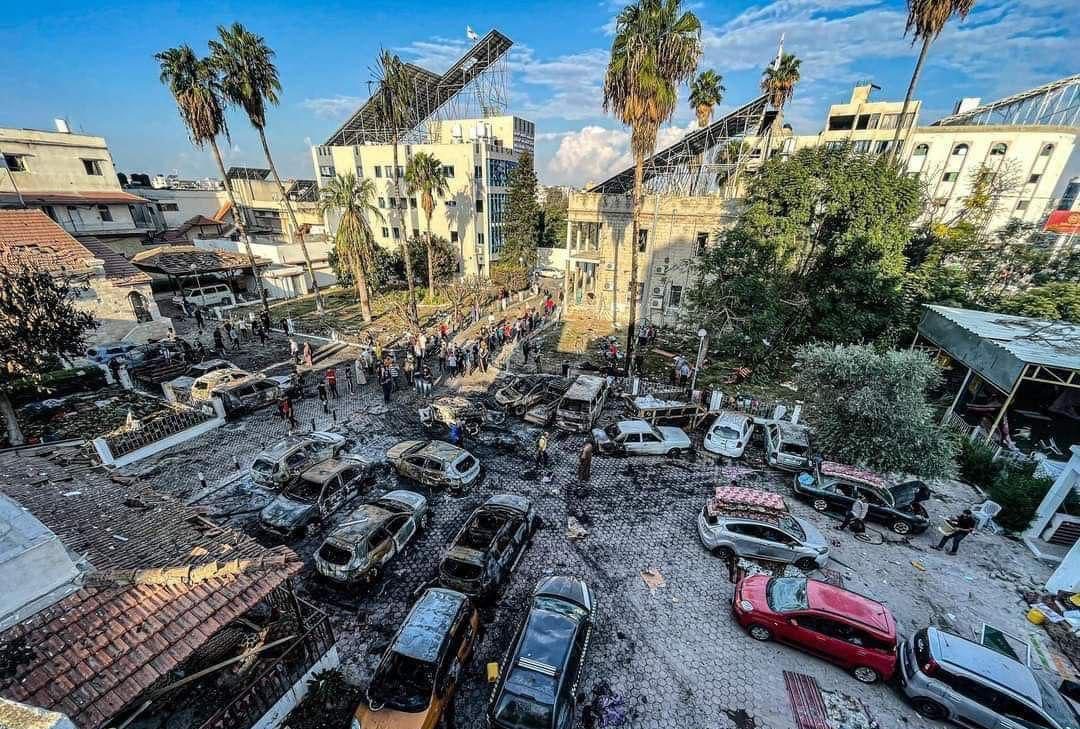With an Israeli siege depriving Gazans of basic needs like food, water and electricity, some Doha residents are living in fear and worry for their loved ones trapped in the Palestinian territory.
“Your teta (grandma) is dying, your teta is dying.”
Maha, whose grandmother is a Qatar resident, recounted to Doha News her dad’s reaction to his mother not replying for three hours a few days back, when Gazans still had access to the internet.
Maha’s grandmother is among a handful of Palestinian Qatar residents who found themselves stuck in Gaza because of the Israeli attacks, away from their families in Doha, after going to Gaza.
“It was the first time I heard my dad cry like this since my grandpa passed away about 15 years ago,” she continued. “We reached out to everyone we knew to seek help for her, but it was out of our hands.”
Her grandmother had flown to Gaza on September 28 via Egypt for her annual visit to see family.
When the Israeli attacks started, two buildings near her family’s home were levelled to the ground, leaving her no choice but to flee south to Khan Younis, near the Rafah border.
Protests erupted across the Arab world, including near the US embassy in Lebanon, and even Palestinian security forces faced demonstrators’ rage in Ramallah.
“Everyone is living in tears,” Maha said. “No one can eat or sleep. We are all terrified of sleeping, not knowing what news we might wake up to.”
Communication became scarce. The family lost contact with her grandmother after Israel cut off electricity and internet in the Gaza Strip.
“If her phone ran out of charge, she had to go to the hospital to charge it,” said Maha.
“We are all living in fear. My dad, my uncles, and aunts can’t sleep at night. We took turns calling her every hour to check up on her.”
Despite being on a Jordanian ministry of exterior list, her grandmother waited at the border for four hours to no avail a few days back, when some Jordanian passport holders were promised to be evacuated.
“They didn’t allow anyone to leave, so we asked her to go back to my dad’s friend’s house,” Maha added. “The next day, she went to the hospital near the house to charge her phone and update us, as there was no electricity elsewhere.”
At least 3,785 Palestinians have been killed in the ongoing Israeli airstrikes on the Gaza Strip, the Health Ministry in Gaza said on Thursday, putting the number of injuries at 13,750.
Thirteen days into the Israeli assault, over one million people — almost half of Gaza’s total population — have been displaced, according to the UN Relief and Works Agency for Palestine Refugees in the Near East (UNRWA).
The events commenced after Hamas launched Operation Al-Aqsa Flood on October 7, a multi-pronged surprise attack in retaliation for the storming of the Al-Aqsa Mosque and increased violence by Israeli settlers.
Israel ordered a complete siege on Gaza since the start of its deadly war on the Palestinian territory, exacerbating the struggle of the area’s 2.3 million population. Gaza has already been living under an Israeli air, land and sea blockade since 2007 that turned it into what has been widely described as “the world’s largest open-air prison”.
The complete blockade was announced amid the ongoing Israeli bombardment of Gaza that has killed at least 3,785 Palestinians, including at least 1,200 children—who represent a third of the total casualties.
The blockade has been widely slammed as a form of “collective punishment” on Palestinians.
Since the escalations, hundreds of dual nationals have flocked to the only border crossing not controlled by Israel in a desperate bid to flee Israeli aggression.
The Israeli occupation forces (IOF) have attacked the Egypt-Gaza Rafah crossing at least three times since last week, destroying much of the infrastructure on the Palestinian side.
On Monday, Egyptian Foreign Minister Sameh Shoukry revealed that his country sought to keep the Rafah crossing open but Israel had prevented it from its side. Egypt has called on potential donors to instead deliver aid to Egypt’s Al Arish International Airport, where other aid flights have already landed.
Tonnes of foreign aid has been stacking up in trucks in Egypt’s Sinai awaiting to enter Gaza through the Rafah crossing.
Israel said that it will not stop humanitarian aid from entering Gaza through Egypt in response to the demands of United States President Joe Biden on Wednesday, though it will maintain a complete siege on the Strip.
The decision was announced by Israeli Prime Minister Benjamin Netanyahu on Wednesday moments after Biden concluded his visit to Tel Aviv.
“In light of President Biden’s demand, Israel will not thwart humanitarian supplies from Egypt as long as it is only food, water and medicine for the civilian population in the southern Gaza Strip,” Netanyahu said in a statement.
The Israeli leader added that he will “not allow any humanitarian aid from its territory to the Gaza Strip” as long as the hostages are not released.
Shortly after Netanyahu’s statement, Biden said that up to 20 trucks would be granted entry to the Rafah crossing from Egypt on Friday. However, the delivery of humanitarian aid does not mean the lifting of the blockade.







